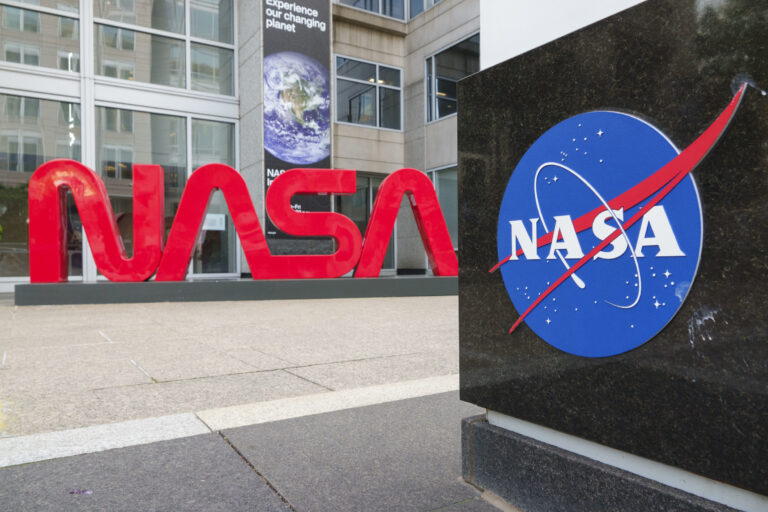NASA is in crisis. The space agency that once embodied American ambition—proof that our government could do bold things and solve hard problems—is now unraveling before our eyes.
More than 2,000 senior staff are heading for the exits. Without help from Congress, science programs will be slashed to the bone. And a permanent administrator is nowhere in sight.
Unless a different vision emerges—one rooted in public ambition and scientific leadership—the U.S. risks forfeiting a field it once defined. The good news? There’s a growing hunger for that kind of vision. The success of the “abundance agenda” in other policy arenas has shown that voters are ready to believe in big things again. Space should be next.
Jared Isaacman, the billionaire entrepreneur and civilian astronaut many expected to lead NASA, had potential to offer exactly this kind of leadership—until his nomination was scrapped under White House scrutiny.

Kevin Carter/Getty Images
Isaacman was graceful in his exit, but his recent commentary has had a clear through-line: space is the high ground, one that gives any country who ventures into it a clear advantage.
As Democrats struggle to connect with the American people, with recent polls showing a 30-year low in popularity, now is the time to show the U.S. electorate a path of inspiration. And the rise of the abundance agenda, applied to space sciences, can be a critical way to galvanize support.
Ezra Klein and Derek Thompson’s bestselling book, Abundance, has shifted the conversation primarily in terms of housing abundance, and recent elections have shown the stickiness of that issue with voters.
But Klein and Thompson also have a deeper diagnosis: American innovation systems are broken. Risk aversion in funding the sciences, high administrative burdens and the pressure of scientific discoveries needing to be converted into mass production, are what hold us back.
Now, as scarcity politics grips Congress, Democrats can seize the opportunity to do more than defend science—they can champion it. By making the case for a bolder, federally-backed innovation agenda, they can show voters how public investment has always been the engine behind America’s greatest breakthroughs. What has been referred to as a stagnating of the U.S. innovation ecosystem, and the “undermining of science in America,” should be leveraged by Democrats to promise voters not just greatness, but more.
As a guest on Andrew Schutlz’s Flagrant podcast, former U.S. Secretary of Transportation Pete Buttigieg outlined how federally funded projects have led to monumental ideas later transformed into usable reality, including the internet itself.
Still, the challenge Democrats face is significant. These sorts of projects are costly, and they don’t come with any certainty, but that’s the point. Unlike the private industry, profit isn’t the motivating factor behind our exploration of the unknown.
Helping voters see the long-term value of such investments will undoubtedly take work. But we’ve done it before. In May 1961, President John F. Kennedy promised America the Moon. The endeavor would demand “a major national commitment of scientific and technical manpower, material and facilities … where they are already thinly spread,” Kennedy said.
And then, it happened.
Beyond international prestige and the assurance of democracy’s strength over communism, the Apollo program seeded “spin-off” technologies that reshaped everyday life. Just as important, it proved what government can accomplish when it channels its full capacity toward shared purpose.
Even after Apollo, NASA had what was referred to as an “aggressive plan” that would continue to position the U.S. as a leader in the exploration and development of the space frontier. That vision was later shelved, a casualty of budget cuts and shifting political winds.
Still, the principle remains: science moves when government moves with it. We saw this again with Operation Warp Speed, where President Donald Trump’s Department of Health and Human Services and Defense used a “whole-of-America” approach to bring the COVID-19 vaccine to the masses, and quickly.
But this spirit is fading. Republicans have seemingly turned their back on the idea of science as a public good.
In response to the president’s proposed cuts to NASA Science, every prior associate administrator of Science signed onto a joint letter to the House Appropriations Committee warning of the potential reduction of funds.
As Congress grapples with what funds to provide NASA in this new fiscal year, Democrats should ask themselves: can we be the party that reclaims science as a shared American project? Can we speak to voters’ appetite for ambition? A promise to pursue abundance—in space, in science, in national purpose—may be the boldest and most unifying offer Democrats can make.
Trump has promised voters a path of greatness, but he’s steering our science agencies dangerously off course. It’s high time for Democrats to chart a better one.
Riley L. Roberts is a writer, speechwriter, and strategist whose work spans politics, business, sports, and culture. As a ghostwriter and collaborator, he has authored or contributed to more than a dozen books, shaped widely published op-eds and essays—from The New York Times and The Wall Street Journal to TIME, VOGUE, and The Atlantic, among other outlets—and crafted speeches delivered at the White House, the U.N., foreign parliaments, TED conferences, and beyond.
Matthew Beddingfield is a whistleblower attorney based in Washington, D.C., and is currently writing a book on the Apollo 1 fire that occurred in January 1967. He previously worked as a legal reporter for Bloomberg.
The views expressed in this article are the writers’ own.


